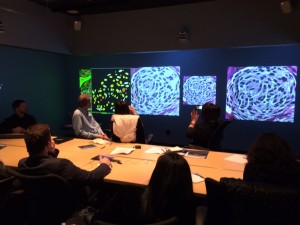Science, like music, is an international language. No matter their cultural, ethnic, or religious backgrounds, no matter if they conduct fieldwork in the U.S. or run a lab in central Asia, scientists always seem able to find common ground.
It’s a fact all competent science communicators understand, and one I was reminded of when a delegation of science and technology professionals from Kyrgyzstan visited RENCI’s Social Computing Room (SCR) on the UNC-Chapel Hill campus on Feb. 12. The group, comprised primarily of women with backgrounds in mathematics, software engineering, and information science, journeyed half way around the world to participate in the Open World Program, a U.S. exchange program that supports and encourages current and future leaders in post-Soviet block countries.
UNC Global hosted the Kyrgyzstan scientists, whose interests ranged from finding partners for academic exchange programs, to learning about new information technologies for teaching and research, to attracting more women to science, technology, engineering and math (STEM) fields.
During their visit, we talked (with assistance from an interpreter) about all those issues and more. As my colleague David Borland (a RENCI senior visualization researcher) began projecting images across the four walls of the SCR, the distance between Chapel Hill, Bishkek, and Osh seemed to shrink.
As educators, the delegation wanted to know how the SCR enables new learning experiences. As techies, they asked about the technical specs for the room. As scientists, they understood the significance of the room’s ability to facilitate collaboration.
Several women asked about RENCI/UNC strategies to attract women into STEM educational programs and careers. Women who work in science, engineering, and technology fields know that diversity is a problem: We must attract more women and underrepresented minorities into STEM fields so that tomorrow’s tool builders and problem solvers reflect the diversity of our population. While it’s frustrating to know this is a worldwide problem, it’s also heartening to realize that young female scientists, born near the end of the Soviet era in a central Asian country I admittedly know little about, share a commitment to addressing this diversity problem.
I told the group about my vision of using the SCR to showcase exciting research and technology to high school and junior high school kids, especially girls. What better way to show how cool it is to work in a STEM field? In turn, the Kyrgyzstan delegation asked our RENCI group for advice and support to build an SCR in their country.
I’m hoping that one day, a bright girl from a village in Kyrgyzstan will walk into an SCR in her country, see science come to life on all four walls, and feel the excitement that puts her on the road to a long and rewarding STEM career.
All because one day in Chapel Hill, a small group of Americans and Kyrgyzstanis found common ground through science.
-Karen Green
Note: Thanks to the aforementioned David Borland, and Ray Idaszak, RENCI’s director of collaborative environments, for making this visit a success. Also thanks to UNC Global and Melissa McMurray for reaching out to RENCI for the Open World visit.
Please email scr-help@renci.org if you are interested in reserving the RENCI Social Computing Room.



